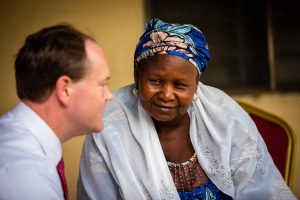CEO of Bradley Foundation criticizes wokeism in business and philanthropy

Numerous commentators have pointed out that what popularly goes under the name “wokeism” is in some sense more than just a political ideology, but a kind of new religion, with its own doctrines of original sin, forgiveness (or lack thereof), salvation, and judgement. For this reason, even though Christianity might not perfectly align with conservative ideologies, it is incumbent upon us to track and be concerned about modern philosophies which constitute rival religions to Christianity.
That’s why recently I spoke with the CEO of the Bradley Foundation and Chairman of the Philanthropy Roundtable Rick Graber on my podcast Meeting of Minds. Rick discusses a fascinating article he recently penned for RealClearMarkets and the Daily Signal (Woke Foundations, Beneficiaries of Capitalism, Undermine Free Market (dailysignal.com)) about how large financial institutions, both for-profit and non-profit, are turning their backs on the system which made their wealth possible in the first place and embracing wokeism as an alternative. Below are some selected questions from the full interview.
You made a point in your interview with Rob Bluey that conservatives are way behind in terms of engagement in the board rooms. In essence it looks like the secular, utopian left has had its way in the board room unopposed (except for a guy named Justin Danhof). We’ve been behind on this, we have some catching up to do.
“Oh, we do Jerry. I'm a corporate lawyer by training and I had always been told and taught that the responsibility of management of a corporation and the responsibility of a board was to the shareholders and only the shareholders, and their job was to manage a really good company that made money and produced results for the shareholders. That has just drifted in very troubling ways in recent years and maybe some would argue that this has been going on for a long time, but it seems to be a big distraction for boards and CEOs and senior level managers to have multiple stakeholders, and that's what's happening. Even some institutions that have been around for many years and have been friendly toward our way of thinking on this, toward Milton Friedman's the way of thinking on this, places like the United States Chamber of Commerce, places like the Business Roundtable out of Washington, DC, are all buying into this multiple stakeholder theory that I think can undermine the effectiveness of businesses in this country. I think it can produce some negative results for people that hold pension funds, for instance. It’s something that we've got to fight back on and you're right, we're way behind, and Justin has been a lone warrior on this. There are others now who understand that this is a problem. Hopefully, it's not too late to the table. But we've got a lot of work to do and frankly, you know, I don't need a CEO to tell me how to think, or how to live my life.”
I'm curious, when you were at Honeywell how much of this was in coming at you back then? It's at high peak now, but maybe it wasn't so strong then. Were you starting to see it?
“There was some of that, you may be familiar with the ALEC organization, which is an association primarily of state legislators that tends to be conservative. There was always an attack on ALEC during my days at Honeywell. It always went to the CEO, always ended up on my desk. I was responsible for Global government relations for Honeywell, and we were able to fight it off. So, it was beginning to happen, but I don't think nearly as intensely as it is now. You see what Delta Airlines did with the Georgia voting election law. You saw what Major League Baseball did. What Coca-Cola did. None of that, I don't think, would have happened during my days at Honeywell. It wasn't that extreme and those are three good examples of CEOs who have just gone totally off the rails.”
I think one of the problems with some of these CEOs, especially the large tech companies, is that they’re publicly traded but they think like they're still privately owned. They can do whatever they want politically rather than be accountable to shareholders.
“Yes, and on the shareholder question you’re right that we all see on all the proxy statements, management suggest voting no, but how strongly do they do that? How much of a public campaign do they conduct on those kinds of things? Not very much again it's get rid of the problem and hope it goes away at least until next year.”
I want to talk a little bit about this New Yorker piece, it read to me like a hatchet job of Paul Bunyanesque proportions, but I'd like to get your take.
“It was a terribly misleading inaccurate article by Jane Mayer which is unfortunate. Really what the Bradley Foundation has done and is doing is fund organizations that are trying to strengthen our election process. This is a fundamental institution in the United States of America and it's really important that people have faith and trust in that institution. And after last year, when the way we elect people in this country changed so dramatically, in part because of COVID, you have way more mail-in ballots and absentee ballots than ever before, by a significant multiple. You've got this concept of ballot harvesting, where people are collecting ballots here in Wisconsin, it was happening in parks in the city of Madison. You've got Mark Zuckerberg dumping hundreds of millions of dollars into governments around the country, primarily in targeted, Democrat strongholds, in an effort to turn out the vote. It is very, very fair to be looking at this and to be asking questions about it and to be suggesting ways to strengthen that institution. That's what the Bradley Foundation is doing. She threw out numbers about how much we had funded in this effort.In 2020, we spent half a million dollars, which is a significant amount of money, but it's far short of the 18 million dollars that she quotes and giving out a built.”
You’ve given out roughly a billion in Grants over time since 1985. Out of that billion, roughly how much has gone to election reform issues?
“Oh my goodness, less than 1%.”
There have also been attempts, both legal and illegal to essentially expose donor lists, which we all know is really a false face for exposing conservative donor list. You were hacked, but there have also been legal attempts which, so far, the courts have swatted down.
“Right. I mean the donor privacy issue is a massive issue. There's also an effort underway by certain people in Washington to revise the rules on donor advised funds and foundations all in an effort, I think, to deter funding, some of it from the right. The round table has wonderful leadership, Westhoff and her team are resisting this at every turn and the reasons are really very sound. This is the most generous country on Earth, and actually that became very clear to me living overseas for the years that we did. It is just not part of the DNA of people in other countries to give up time and resources the way we do in this country. It's part of who we are. We give as much or more than almost any country in the world. Why are we messing with this? Why do we have to regulate and change and fix something that doesn't need fixing? People were concerned after COVID that giving would go down. In fact, it went up dramatically. That's the American people.
“Specifically on the donor privacy issue. I think there are grave concerns that people are afraid that if some of the stuff becomes public that they're going to get harassed, and you know what will happen then? They just won’t give them money. We've got to resist it at every turn. And again, this is one of the core institutions of this country. It's part of our culture. Yes, and it's something that we have to fight to preserve because it's great and it is great in what it can accomplish and has accomplished.”
To listen to the full interview, click here.
Jerry Bowyer is financial economist, president of Bowyer Research, and author of “The Maker Versus the Takers: What Jesus Really Said About Social Justice and Economics.”





























